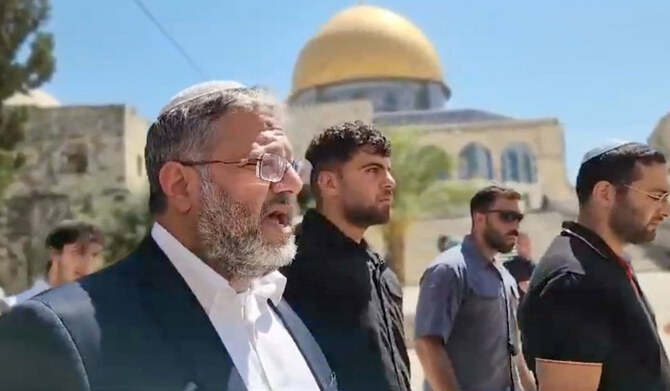CHICAGO: There are “many more” regime prisons in Syria than previously believed, a high-level delegation of US diplomats said on Friday as they searched for missing Americans in the country.
In the first official visit to Syria by American officials in 12 years, the delegation met on Friday with members of the country’s interim leadership both to urge the formation of an inclusive government and to locate US citizens who disappeared during the conflict.
Western countries have sought to establish connections with senior figures in the Hayat Tahrir Al-Sham militant group that led the offensive which forced President Bashar Assad from power this month.
Secretary of State for Near Eastern Affairs Barbara Leaf, who led the US delegation, told journalists, including Arab News, that the delegates attended a commemorative event for “the tens of thousands of Syrians and non-Syrians alike who were detained, tortured, forcibly disappeared or are missing, and who brutally perished at the hands of the former regime.”
Among the missing Americans are freelance journalist Austin Tice, who was kidnapped in 2012, and Majid Kamalmaz, a psychotherapist from Texas who disappeared in 2017 and is thought to have died.
Special Presidential Envoy for Hostage Affairs Roger Carstens, who is part of the delegation, said the number of prisons in which detainees were tortured and killed by the Assad regime is much higher than suspected.
“We thought there’d be maybe 10 or 20,” he said. “It’s probably more like 40; it might even be more. They’re in little clusters at times. Sometimes they’re in the far outreaches of Damascus.
“Over 12 years, we’ve been able to pinpoint about six facilities that we believe have a high possibility of having had Austin Tice at one point or another. Now, over the last probably 11 or 12 days, we’ve received additional information based on the changing conditions, which leads us to add maybe one or two or three more facilities to that initial number of six.”
Carstens said the US has limited resources available in Syria and will focus on six of the prisons in an attempt to determine Tice’s fate. But he said the search would eventually expand to cover all 40 prison locations.
“We’re going to be like bulldogs on this,” he said. “We’re not going to stop until we find the information that we need to conclude what has happened to Austin, where he is, and to return him home to his family.”
He said the FBI cannot be present on the ground in Syria for an extended period of time to search for missing Americans “right now,” but suggested this might change in the future. Meanwhile, the US continues to work with “partners,” including nongovernmental organizations and the news media in Syria, he added.
Leaf confirmed the delegation met Ahmad Al-Sharaa, the commander of Hayat Tahrir Al-Sham, an Islamist group that was once aligned with Al-Qaeda and is still designated as a terrorist organization by Washington. She said she told Al-Sharaa the US would not pursue the $10 million reward for his capture, and hoped the group will be able to help locate Tice and other missing Americans.
The delegation received “positive messages” from the Syrian representatives they met during their short visit, Leaf said. America is committed to helping the Syrian people overcome “over five decades of the most horrifying repression,” she added.
“We will be looking for progress on these principles and actions, not just words,” she said. “I also communicated the importance of inclusion and broad consultation during this time of transition.
“We fully support a Syrian-led and Syrian-owned political process that results in an inclusive and representative government which respects the rights of all Syrians, including women and Syria's diverse ethnic and religious communities.”
Leaf said the US would be able to help with humanitarian assistance and work with Syrians to “seize this historic opportunity.”
She added: “We also discussed the critical need to ensure terrorist groups cannot pose a threat inside of Syria or externally, including to the US and our partners in the region. Ahmad Al-Sharaa committed to this.”
Bringing Assad to justice for his crimes, particularly those carried out during the civil war, which started in 2011, remains a priority for the US government, Leaf said.
“Syrians desperately want that,” she added.
She called on the international community to offer technical expertise and other support to help document Assad’s crimes, including evidence from the graves and mass graves that have been uncovered since his downfall on Dec. 8.






















